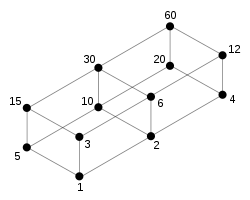Betrothed numbers
Betrothed numbers or quasi-amicable numbers are two positive integers such that the sum of the proper divisors of either number is one more than the value of the other number. In other words, (m, n) are a pair of betrothed numbers if s(m) = n + 1 and s(n) = m + 1, where s(n) is the aliquot sum of n: an equivalent condition is that σ(m) = σ(n) = m + n + 1, where σ denotes the sum-of-divisors function.
The first few pairs of betrothed numbers (sequence A005276 in the OEIS) are: (48, 75), (140, 195), (1050, 1925), (1575, 1648), (2024, 2295), (5775, 6128).
All known pairs of betrothed numbers have opposite parity. Any pair of the same parity must exceed 1010.
Quasi-sociable numbers
Quasi-sociable numbers or reduced sociable numbers are numbers whose aliquot sums minus one form a cyclic sequence that begins and ends with the same number. They are generalizations of the concepts of betrothed numbers and quasiperfect numbers. The first quasi-sociable sequences, or quasi-sociable chains, were discovered by Mitchell Dickerman in 1997:
- 1215571544 = 2^3*11*13813313
- 1270824975 = 3^2*5^2*7*19*42467
- 1467511664 = 2^4*19*599*8059
- 1530808335 = 3^3*5*7*1619903
- 1579407344 = 2^4*31^2*59*1741
- 1638031815 = 3^4*5*7*521*1109
- 1727239544 = 2^3*2671*80833
- 1512587175 = 3*5^2*11*1833439
References
- Hagis, Peter, jr; Lord, Graham (1977). "Quasi-Amicable Numbers". Math. Comput. 31 (138): 608–611. doi:10.1090/s0025-5718-1977-0434939-3. ISSN 0025-5718. Zbl 0355.10010.
- Sándor, József; Mitrinović, Dragoslav S.; Crstici, Borislav, eds. (2006). Handbook of Number Theory I. Dordrecht: Springer-Verlag. p. 113. ISBN 978-1-4020-4215-7. Zbl 1151.11300.
- Sándor, Jozsef; Crstici, Borislav (2004). Handbook of Number Theory II. Dordrecht: Kluwer Academic. p. 68. ISBN 978-1-4020-2546-4. Zbl 1079.11001.
